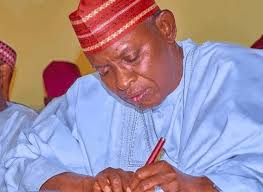Governor Abba Kabir Yusuf of Kano State has announced his intention to report what he described as the abuse of court orders to the Nigeria Governors’ Forum.
He made this declaration in response to a recent court order that restrained the reinstatement of former Emir Muhammadu Sanusi II and blocked the dethronement of five other Emirs in the state.
The interim injunction was granted by Justice Abdullahi Muhammad Liman of the Federal High Court in Kano.
The order directed the Inspector General of Police, Kano State Police Commissioner, Nigeria Security and Civil Defense Corps (NSCDC), and the Department of State Services (DSS) to refrain from enforcing the Kano State Emirate Council (Repeal) Law.
READ ALSO: Muhammadu Sanusi Receives Appointment Letter As Kano Emir
This law had been a focal point of contention and was challenged by Aminu Babba Danagundi, who holds thetitle of title of Sarkin Dawaki Babba.
Governor Yusuf, speaking shortly after issuing the reinstatement letter to Alhaji Muhammadu Sanusi II at Africa House, the Kano State Government House, expressed his frustration with the court’s decision.
“The personwho who issued the court order was inAmerica, America, but he is ordering us to stop what we are doing,” Yusuf stated. “This issue of abuse I must present before the Governors’ Forum so that we can tackle it accordingly.”
READ ALSO: UPDATED: Protest Hits Villa, NASS Over Sanusi’s Reinstatement
Yusuf emphasized his administration’s commitment to due process, asserting that their actions were conducted transparently and in the public eye. “We are agents of following due process;; that’s why we did what we did openly before everybody. Those that are meant to maintain that rule of lawmust also must also follow it,” he added.
The situation has intensified the ongoing political and legal struggles surrounding the traditional leadership in Kano State. Governor Yusuf’s decision to escalate the issue to the Nigeria Governors’ Forum underscores the broader implications of the court’s intervention on governance and traditional authority in the region.
